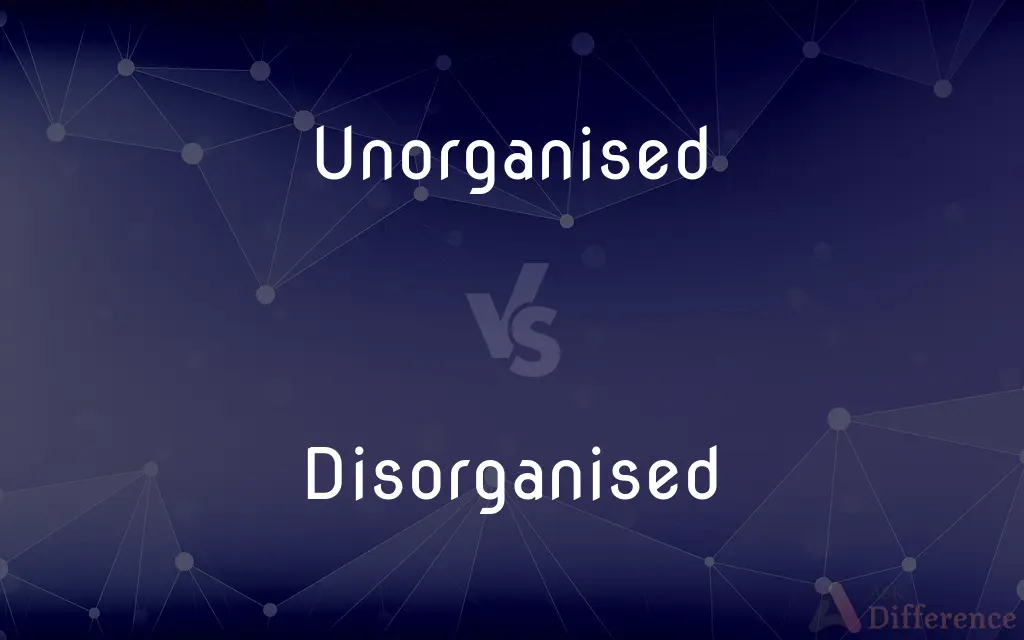Unorganised vs. Disorganised — What's the Difference?
By Fiza Rafique & Urooj Arif — Updated on March 11, 2024
Unorganised refers to a lack of structure or planning from the outset, while disorganised indicates a state of disorder or confusion, often from a disruption of existing order.

Difference Between Unorganised and Disorganised
Table of Contents
ADVERTISEMENT
Key Differences
Unorganised typically describes a situation, group, or system that lacks formal structure, planning, or arrangement from the beginning. It implies an absence of organization rather than the presence of chaos. For instance, an unorganised meeting might simply mean it was impromptu, without a clear agenda or predefined topics. On the other hand, disorganised conveys a sense of chaos, messiness, or inefficiency within an existing structure. It suggests that while there was an attempt at organization, it either failed or was disrupted. A disorganised desk, for example, indicates that although there might have been an initial order, it has since become cluttered and inefficient.
Unorganised situations or entities often operate without established rules, protocols, or systems, which can sometimes allow for flexibility and spontaneity. This lack of formal organization can be suitable for casual, informal settings or early stages of planning. Conversely, being disorganised typically results in inefficiency, confusion, and difficulties in locating information or completing tasks effectively. This state often requires intervention to restore order and improve functionality.
The term unorganised might apply to groups or sectors that operate without formal structures, such as unorganised labor, which refers to workers not unionized or formally registered. This status can affect the negotiation for wages and working conditions. Whereas, disorganised can describe anything from thoughts to physical spaces, highlighting a deterioration from a previous state of order. For example, a disorganised person may struggle to keep track of their schedule or find necessary items, impacting daily efficiency.
In some contexts, being unorganised can be a temporary or initial state, suggesting potential for development or organization in the future. It does not inherently carry a negative connotation unless the lack of organization leads to problems. Disorganised, however, typically implies a negative impact on productivity, clarity, or efficiency, suggesting a need for improvement or corrective action to return to a state of order.
While both adjectives describe scenarios deviating from ideal organization, the distinction lies in their implications: unorganised lacks a foundation of order, offering a neutral or potentially positive openness to structure; disorganised denotes a collapse or absence of effective structure, emphasizing the need for reorganization to achieve or regain optimal function.
ADVERTISEMENT
Comparison Chart
Definition
Lacking formal structure, planning, or arrangement
Existing structure is cluttered, inefficient, or chaotic
Implication
Absence of initial order
Presence of disorder from disrupted order
Typical Contexts
Casual or informal settings, early planning stages
Workspaces, thoughts, processes requiring order
Examples
Unorganised meeting, unorganised labor
Disorganised desk, disorganised thoughts
Impact on Efficiency
Neutral or potentially positive, depending on context
Generally negative, hindering functionality
Compare with Definitions
Unorganised
Not systematically arranged.
The unorganised files made it difficult to start the project.
Disorganised
Chaotic or messy.
The disorganised room was impossible to navigate.
Unorganised
Lacking formal structure.
The unorganised group struggled to reach a consensus.
Disorganised
Lacking efficiency.
His disorganised work habits affected the project's given time.
Unorganised
Without preplanning.
They held an unorganised rally in the park.
Disorganised
Disturbed from an initial order.
After the move, her schedule became disorganised.
Unorganised
Potential for future organization.
The notes were unorganised but contained great ideas.
Disorganised
Needing reorganization.
The disorganised files required sorting to be useful.
Unorganised
Informal or casual.
We had an unorganised gathering at the café.
Disorganised
Confused or unclear.
Disorganised thoughts made the essay difficult to understand.
Unorganised
Poorly organised, lacking the ability to organise.
Disorganised
Lacking order or organisation; confused; chaotic.
Unorganised
(of an object) Not organised, not having any arrangement.
Disorganised
Simple past tense and past participle of disorganise
Unorganised
Not having or belonging to a structured whole;
Unorganized territories lack a formal government
Disorganised
Lacking order or methodical arrangement or function;
A disorganized enterprise
A thousand pages of muddy and disorganized prose
She was too disorganized to be an agreeable roommate
Unorganised
Not affiliated in a trade union;
The workers in the plant were unorganized
Common Curiosities
What causes something to be unorganised?
A lack of initial planning, formal structure, or arrangement can lead to something being unorganised.
Is being unorganised always negative?
Not necessarily; in some contexts, being unorganised can allow for flexibility and spontaneity.
How does disorganisation affect productivity?
Disorganisation typically affects productivity negatively by causing inefficiency, confusion, and difficulty in completing tasks.
Can disorganised thoughts be managed?
Yes, through techniques such as mindfulness, organization tools, and structured thinking practices, disorganised thoughts can be managed.
How do unorganised labor sectors impact workers?
Workers in unorganised sectors may face challenges like lack of formal contracts, benefits, and collective bargaining power.
Can technology contribute to becoming disorganised?
Yes, without proper management, the overload of digital information and notifications can contribute to disorganisation.
How can one prevent a space from becoming disorganised?
Regular maintenance, clear systems of order, and periodic decluttering can prevent a space from becoming disorganised.
Can disorganised systems be improved?
Yes, disorganised systems can often be improved by implementing or restoring order and efficiency through organization.
Can a group start as unorganised and become disorganised?
A group can start as unorganised with a potential for organization, but it may become disorganised if initial attempts at order lead to chaos.
What is the difference in implications between unorganised and disorganised?
Unorganised implies a neutral or open state lacking formal order, while disorganised implies a negative state of chaos or inefficiency.
What role does planning play in avoiding being unorganised?
Effective planning can prevent being unorganised by establishing a clear structure and order from the outset.
How does one transition from disorganised to organised?
Transitioning involves decluttering, establishing clear systems, and maintaining discipline in following organizational practices.
Does the concept of unorganised versus disorganised apply to digital spaces?
Yes, digital spaces can also be unorganised (lacking structure) or disorganised (cluttered and inefficient), with similar impacts on functionality and productivity.
What strategies can help in dealing with disorganisation?
Strategies include setting clear goals, prioritizing tasks, using organizing tools, and seeking help if overwhelmed.
Is it easier to organize something that is unorganised or disorganised?
It's generally easier to organize something that is unorganised, as it lacks initial chaos and may simply need structure, whereas disorganised entities require untangling existing confusion.
Share Your Discovery

Previous Comparison
Wagon vs. Cart
Next Comparison
Diligent vs. MeticulousAuthor Spotlight
Written by
Fiza RafiqueFiza Rafique is a skilled content writer at AskDifference.com, where she meticulously refines and enhances written pieces. Drawing from her vast editorial expertise, Fiza ensures clarity, accuracy, and precision in every article. Passionate about language, she continually seeks to elevate the quality of content for readers worldwide.
Co-written by
Urooj ArifUrooj is a skilled content writer at Ask Difference, known for her exceptional ability to simplify complex topics into engaging and informative content. With a passion for research and a flair for clear, concise writing, she consistently delivers articles that resonate with our diverse audience.













































